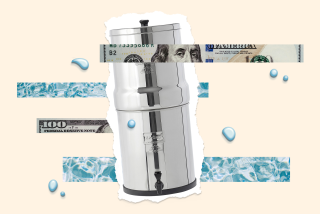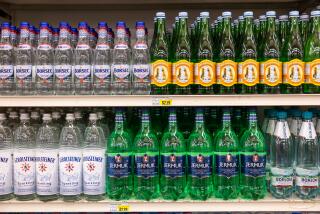Crisis for Firm That Turned Water to Gold : Imports: Perrier made bottled water a symbol of fitness. Although the French press is making light of the recall, it is still a blow to the company.
- Share via
PARIS — If the benzene contamination scare causes the bubble to burst for Perrier, it will be the first setback in a remarkable success story for a French firm exporting to the United States.
In the 15 years since Gustav Leven, the chairman of Groupe Perrier, moved into the American market, he has not only made Perrier a household word, but he also virtually created a booming bottled-water industry in the United States.
Leven, a maverick, somewhat secretive Paris financier, was once ridiculed in France for what was regarded as his zany idea of wanting to sell water to Americans. Now he is celebrated as a marketing genius, one of the first to anticipate the health and fitness movement.
He took his product--spring water carbonated with natural carbonic acid gas at a huge factory near the spring in Vergeze, France--and made it a symbol of physical fitness, an alternative to wine and spirits. Before that, it had been promoted as a treatment for gout and urinary infections, among other ailments.
He also sponsored marathon races and built more than 200 Perrier fitness parks around the United States.
With Perrier in the lead, the American bottled-water industry rose like a geyser. Sales increased from 500 million gallons in 1978 to more than 1.8 billion gallons in 1989.
On Wednesday, Perrier executives announced a total recall of their product from the 120 countries where it is sold after small amounts of benzene contamination were detected in bottles of Perrier water in Canada, the Netherlands and Denmark, as well as in the United States. Company officials said it will take 2 1/2 months to replace the 160 million bottles it has distributed around the world.
Perrier managing director Frederik Zimmer said the contamination was caused when workers at the Perrier plant in Vergeze failed to change a filter that is supposed to catch small amounts of benzene found naturally in the spring.
Earlier in the week, after 72 million bottles were recalled in the United States, the French public and press reacted with indifference, even hostility, to what they considered American fastidiousness.
A bartender at Fouquet’s, the elegant restaurant on the Avenue des Champs-Elysees, told a reporter: “In the five hours I’ve been here, I’ve sold at least 15 Perriers. There’s been no decrease.”
Bartender Leo Meyer at the Cafe de Paris, near the Opera, said that one of his customers, an American who “always drinks Scotch with Perrier, asked for Scotch with benzene.”
Before Wednesday’s total recall, much of the French press, including the dailies Le Monde and Le Figaro, all but ignored the Perrier contamination scare in the United States. The tabloid newspaper Liberation treated the incident as if it were just another example of America’s obsession with hygiene. Frederic Filloux, Liberation’s New York correspondent, wrote:
“The Perrier (recall) decision has to be viewed in the American context. It is a country dedicated to ultra-greasy fried and excessively rich food. But the slightest hint of ‘chemical intoxication’ makes it paranoid.”
The U.S. recall was ordered after small, nontoxic amounts of benzene were found in routine tests in North Carolina. The U.S. Food and Drug Administration said the amounts were not high enough to pose “a significant short-term health risk.”
Still, the recalls are clearly a blow to the company that had carefully built its image on what it said was a pure and healthy beverage. Phone lines were jammed at the company’s glass-fronted headquarters in central Paris, as harassed executives attempted to reassure investors.
Groupe Perrier, which is controlled by the Leven family and the large French holding company EXOR, which owns 34% of the stock, has frequently been the subject of takeover rumors, including reports that it was a target for the American giants Coca-Cola and Pepsi.
The spring that produces Perrier water has been known from Roman times. Near Nimes in the Provence region, it was used as a resting place by Hannibal in 218 B.C., before he crossed the Alps into Italy.
The water takes its name from Louis Eugene Perrier, a local doctor and specialist in “hydrotherapy,” who devised a number of money-making schemes for the water, including using it to make lemonade and sparkling wine. It has been promoted as a cure for stomach ailments, rheumatism, bone fractures, gout, tonsillitis, bronchitis and mild cases of tuberculosis.
In 1903, the spring was purchased by an Englishman, A. W. St. John Harmsworth, the younger of two brothers who were both press magnates. Harmsworth, paralyzed from the waist down after an automobile accident, believed that the water might help to restore him.
British control of the spring ended in 1949, when it was purchased by Leven on behalf of his family. He capped the spring with concrete and marketed the water as “the water of sportsmen.” Leven also purchased the rights to the famous springs in Vichy and two other popular still-water sources, Volvic and Contrexeville, making his family one of the two principal water producers in France, along with Societe des Eaux Minerales (Evian).
His most audacious move came in 1976, when he moved into the giant, mostly unexploited American market.
In the years since, Leven has quietly bought up many large American bottled-water companies, including the nation’s largest, Arrowhead of Southern California. Perrier now accounts for only 15% to 16% of the company’s U.S. sales. Other Perrier-owned waters are Poland Spring, in Maine; Oasis and Ozarka, Ark., and Zephyrhills, Fla.
More to Read
Inside the business of entertainment
The Wide Shot brings you news, analysis and insights on everything from streaming wars to production — and what it all means for the future.
You may occasionally receive promotional content from the Los Angeles Times.










